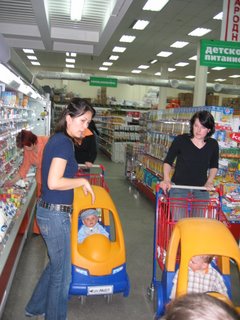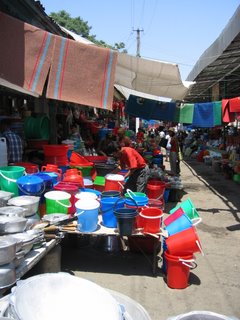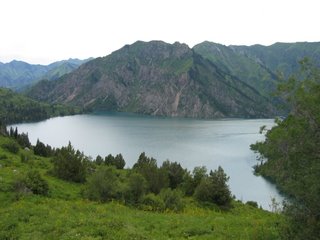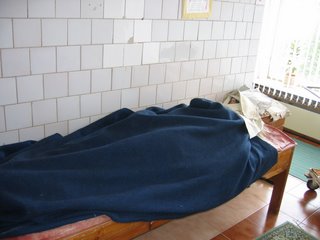
June 28, 2006
On Sunday, I joined Boris for one of his fabulous group trips out to nature. This time, he went to Ala Archa, for a hike to the waterfall – a place I hadn’t been before. It was a much needed and appreciated breath of fresh air.
A lot of other people had the same urge. The group filled up two buses. But as the only foreigner in the group, it was still a nice opportunity to practice Russian and to catch up with some of the frequent hikers I knew.
On the way there, we stopped at the Khan’s grave, a monument to Baitik Batir. He lived from 1820 to 1886 and was a leader of a Kyrgyz tribe. He is credited with freeing Kyrgyzstan from Khokand domination and uniting it with Russia.
The sandy brick structure includes arches, minarets, and rounded domes, much like a mosque. A pregnant woman in a sky and cloud-colored dress ran her hands over the bricks as she walked around the structure. She made several rounds, looking reverent, her dyed blond hair covered with a beige headscarf.
Boris told us that the monument is a holy site and is visited by women who can’t give birth or get married.
Some people in the group continued through the cemetery, long weeds and flowers rubbing against their legs, to see the tall, black metal structure honoring Batir’s assistant, Boshkoi Batir Ozber-bai. Others tried their luck at prayers, inserting money into a locked metal box, reaching their hands through the metal grate and holding them outstretched, wishing (presumably for a mate or a child).
An ostrich farm was located near the monument, where people could pay about a dollar to look at the ostriches imported from Australia, or buy an egg for $75.
Ala-Archa is just over twenty miles from Bishkek, but once in the park, it feels like being deep in the Alps. In 1985 it was made into a national park. Due to its glaciers, it is the coldest canyon in the area.
Because of its proximity to the capital and the good roads there, it receives a lot of visitors. The lot is always packed with cars. Not the Moskvichs and rumbling old buses of Sary Chelek, but Maximas, Opels, Audis, BMWs, VWs, Landrovers, and the clearly marked SUV of the International Red Cross.
There are two types of visitor to Ala-Archa – the picnicker and the hiker. Most visitors are picnickers. They find a spot with a view of the rushing river, claim their territory, and sitting there in front a constant supply of food for the entire day. Unfortunately, enough of these people lack environmental awareness that the picnic areas are littered with refuse.
The hikers don’t have to travel far to get away from the crowds. They disappear into the mountains and find remote, clean places to rest and lunch. They find fields of white, purple and yellow wildflowers bursting into bloom in the late morning sunlight. They feel the icy water running over stones as they scamper across streams. They feel the geological past as they cross fields of boulders sprouting moss. They appreciate the power of the mountains as they approach the jagged peaks.
I saw families seated on rocks or among wildflowers, enjoying self-catered picnics. I watched an old couple enthusiastically gathering wild herbs along the way.
The walk to the waterfall was largely uphill and challenging. It took almost two hours. When we got there, I sat with Feruza, an analyst at the electrical company, and her 12-year-old daughter sasha. I was also semi-supervising Bagdan, my friend’s 10-year-old son, who she’d sent on the trip alone.
We sat near the waterfall, where we could watch the water splashing from the rocks 50 meters up in a sunlit spray. It hit the shaded black rock mid-waterfall, then ran down in streams of white rivulets. Young people approached and stood against the falls, getting soaked for the sake of a memory or a photo. The numerous rapids that emerged from the falls extended their sound around us, like a song that we could stand in the middle of.
Everyone else was returning on the bus. But I’d brought my bike and planned to bike back to the city. So I walked back down ahead of schedule and began my 2.5 hour ride back home.
It was the first longer trip my new bike had taken. It handled the distance and the roughness pretty well. But I don’t feel like I got much exercise. It was almost all downhill. I never really thought it possible to coast almost nonstop for about 20 miles, but from Ala-Archa to Bishkek, it can be done. It felt more like a motorcycle ride, which wasn’t bad either.










